Photo: Paul Natkin/Getty Images
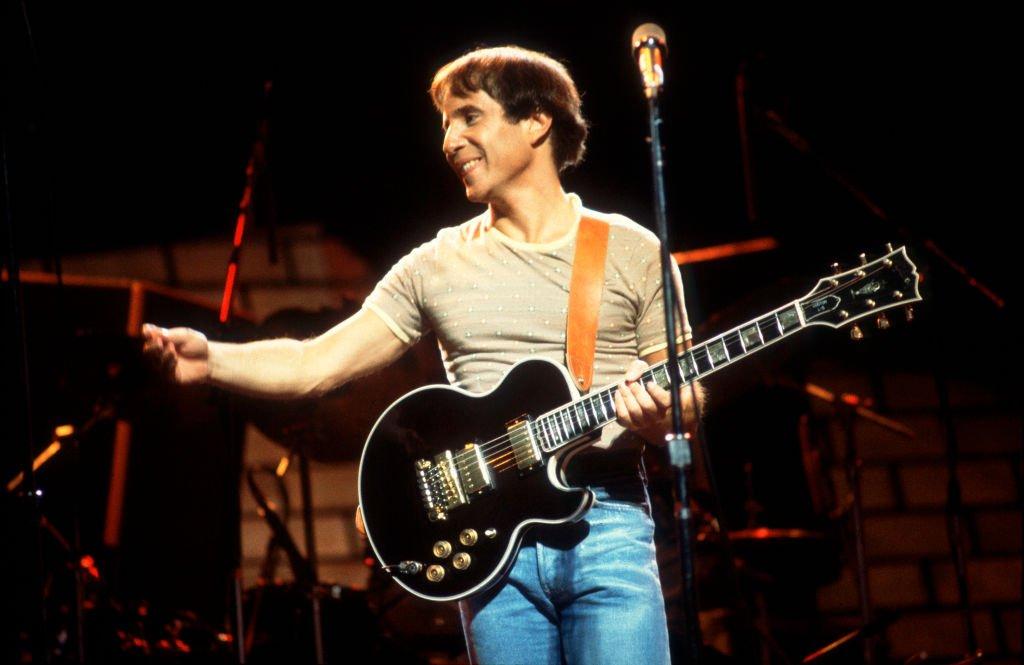
list
5 Artists Influenced By Paul Simon: Harry Styles, Lorde, Conor Oberst & More
Paul Simon’s songs linger long, and are examples of excellence for generations of musicians. Ahead of "Homeward Bound: A GRAMMY Salute to the Songs of Paul Simon," re-airing Wednesday, May 31, on CBS, artists reflect on Simon's profound influence.
Updated Monday, May 22, to include information about the re-air date for "Homeward Bound: A GRAMMY Salute To The Songs Of Paul Simon."
"Homeward Bound: A GRAMMY Salute To The Songs Of Paul Simon" will re-air on Wednesday, May 31, at 9 p.m. ET/PT on the CBS Television Network, and will be available to stream live and on demand on Paramount+.
Paul Simon is a living legend. For nearly six decades, the New Yorker has gifted his songs to the world. An innovator — not just a folk singer — Simon’s curiosity led to constantly discovering new soundscapes. He incorporated these rhythms and instrumentation into his melodies, and then added poetic lyrics to create character-driven narratives.
These compositions are like old friends; they linger long after the needle lifts or the stream ends. Generations have sung Simon’s songs — finding joy in their playful rhythms and sorrow in their beauty.
The accolades and awards are endless: a two-time inductee into the Rock and Roll Hall of Fame, a member of the Songwriters Hall of Fame, a 16-time GRAMMY winner, multiple recordings in the GRAMMY Hall of Fame and a Lifetime Achievement Award from the Recording Academy to name just a few.
In a clip from "Homeward Bound: A GRAMMY Salute to the Songs of Paul Simon," which will re-air on Wednesday, May 31, at 9 p.m. ET/PT on the CBS Television Network, Elton John calls him "one of the greatest songwriters of all time" — high praise from an artist with 35 GRAMMY nominations and five wins. Simon’s contemporaries are not the songwriter’s only fans: The writer of iconic songs such as "Bridge Over Troubled Water," "Graceland," "The Boxer," and "50 Ways to Lose Your Lover," has generations of artists as worshippers of his art who continue to discover his deep catalog.
Singer-songwriters, pop stars, country artists and rappers all claim Simon as a musical mentor. For example, Kid Cudi sampled "50 Ways to Leave Your Lover" on his debut mixtape A Kid Named Cudi in the referentially titled "50 Ways to Make a Record." In a Forbes Q&A, Canadian songwriter Donovan Woods cites "Obvious Child" as his all-time favorite.
In advance of the GRAMMY salute to Simon next week, here are five artists that credit the songwriter as a key to their musical education.
Read More: How To Watch "Homeward Bound: A GRAMMY Salute To The Songs Of Paul Simon"
Harry Styles
Listen to Harry Styles’ turn of phrase and poetic lyrics, and hints of Simon’s influence are evident. Even back in his One Direction days, Styles cited Simon as a touchstone. In an MTV interview, following the release of the boy band’s 2015 bestseller Made in the A.M., Styles said his favorite track was "Walking in the Wind" since it was inspired by Simon.
"I’m a big Paul Simon fan and I think the inspiration behind it is Graceland," Styles said. "The way in which the verse is so conversational and informal, and it’s not like melody melody melody — it’s like spoken word, and kind of drifts and peaks and troughs. I love that album and when I listen to it I love hearing the influence from that in his song."
In a 2019 Rolling Stone interview, Styles again gave a nod to Simon. "I wish I had written '50 Ways to Leave Your Lover,'" he said. "That’s the greatest verse melody ever written, in my opinion. So minimal, but so good — that drum roll."
Conor Oberst
In a 2011 New York magazine profile on Paul Simon, the singer-songwriter from Omaha, Nebraska, is quoted talking about what a major influence the writer of "The Boxer" is on his art. "I grew up with my folks listening to him," Oberst told writer Alan Light. "But as I got into songwriting, I realized how profound what he does actually is. His work over the years is a treasure trove of ideas."
Listen to Oberst’s cover of "Kodachrome," recorded with his alt-country band the Mystic Valley Band, which he once performed at the Austin City Limits Festival in 2008, telling the audience it was a popular sing-along on the tour bus.
Vampire Weekend
These New York indie rockers burst onto the scene in the mid-2000, and comparisons to Simon abounded beginning with their 2008 self-titled debut. Listen to "Cape Cod Kwassa Kwassa" from their debut; the Simon influence is undeniable — especially his Graceland period.
In a 2019 interview with Radio X, frontman Ezra Koenig was asked about a show that would stay with him forever. He paused, then answered Simon’s Homeward Bound Farewell Tour in 2018. "He is such a legend…We’ve been compared to him many times and he is an influence. We are from the same part of the country…I have a lot to look up to and find in common with him."
Shawn Colvin
The three-time GRAMMY winner Shawn Colvin considers Simon a key piece of her songwriting education. Colvin’s father played guitar and taught her early on; he also played many of the singer-songwriters of the day that included the boy from New York.
Particularly at the start of her career, Colvin always performed "Kathy’s Song" in her sets. In a 2015 interview, the songwriter cited Simon as one of her mentors. "Joni Mitchell was a big time [influence on] me, but also James Taylor, Paul Simon and Bob Dylan to an extent," she said.
Lorde
The expressive and introspective New Zealand singer-songwriter considers Simon the benchmark for excellence in her craft — a bar she reaches for each day. In a 2017 profile in The Guardian she revealed the following goal:. "I want to be really, really good one day. I think I’m pretty good now. I think I’ve made a good start. But I want to be Paul Simon." Four years later, Lorde named Simon’s "Graceland" as the song she wishes she’d written in this Vogue 73 vide interview.
Listen to Lorde and Jack Antonoff (Bleachers) perform a stripped down duet of "Me and Julio Down by the Schoolyard" at the 2017 Outside Lands Festival in San Francisco’s Golden Gate Park.
8 Highlights From "Homeward Bound: A GRAMMY Salute To The Songs Of Paul Simon"
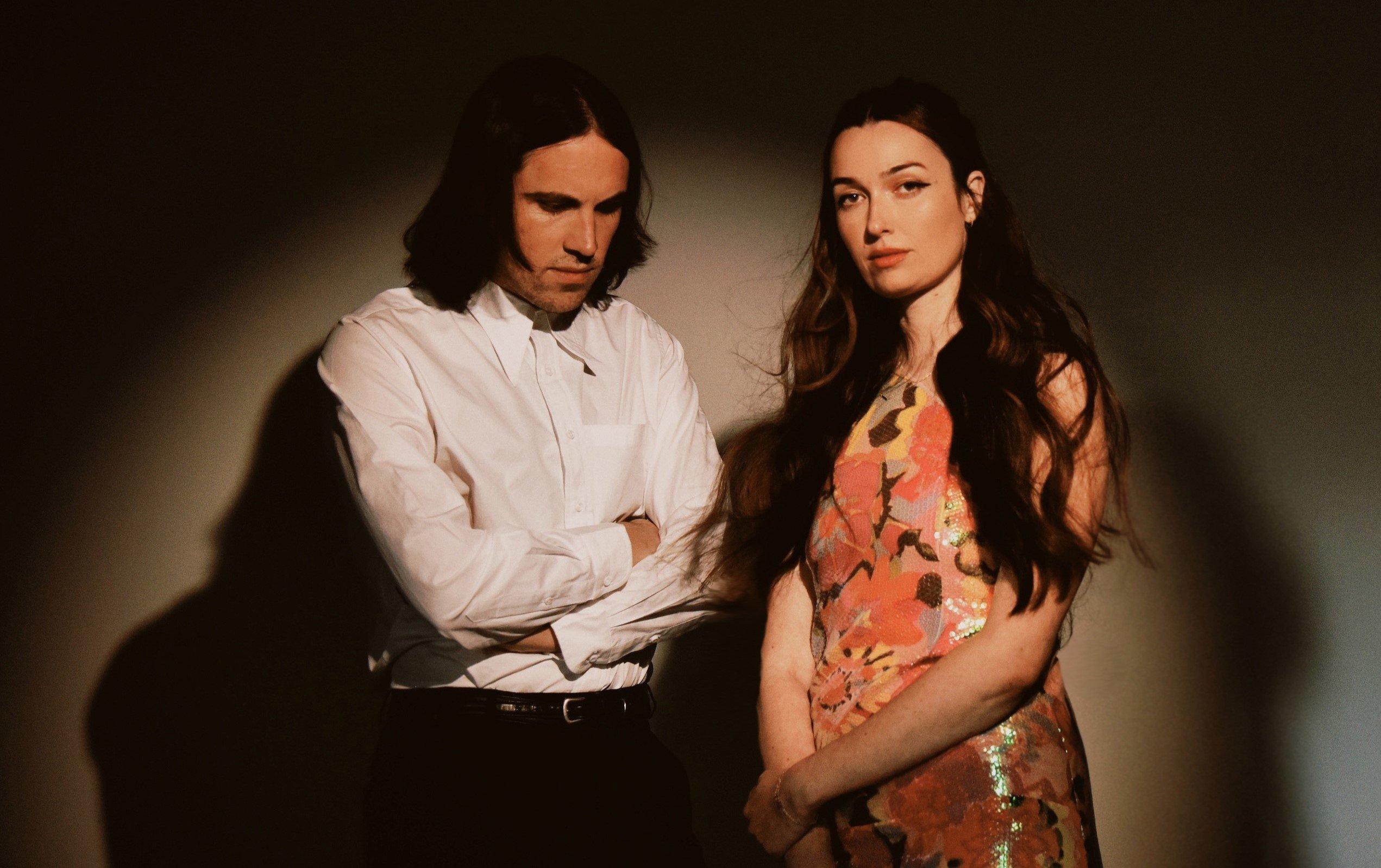
Photo: Shervin Lainez
interview
Cults' Evolution: Madeline Follin & Brian Oblivion Discuss Their Upcoming Album 'To The Ghosts'
Out July 26, Cults' new album reflects their 15-year journey as artists. Ahead of their Lollapalooza performance and U.S. tour, the duo discuss how they've pushed their sound forward.
Over the past 15 years, Cults have captivated audiences with their atmospheric, layered compositions that pack a pop-friendly punch. Now, on the brink of releasing their fifth album, To The Ghosts, on July 26, Madeline Follin and Brian Oblivion reflect on their journey and new creative freedom.
While their previous albums required the duo to stick to deadlines precariously organized between tours, the pandemic provided new circumstances. Freed of distractions and obligations, Follin and Oblivion traveled to Los Angeles in 2022 to join up with their longtime producer Shane Stoneback (Vampire Weekend, Sleigh Bells) to craft an album that looks back on their past while pushing their sound ahead.
"We don't have the sales pitch for the album down yet, but there's no other band that sounds like us," says Oblivion. "We're digging into our thing, and if you're into anything we've done before, you'll love this one."
Adds Follin, "We're like no other."
The album title is addressed to the ghosts of both Oblivion and Follin's past selves. As Oblivion explains, their four prior albums were time capsules that reflected the period in which each album was written and recorded. This release is something different.
To The Ghosts is a personal landmark for Follin, particularly. In 2020, upon the release of Cults' fourth album Host, she admitted that she'd been too shy to bring her own songwriting and demos to the table for the band's first three albums. It was Stoneback's encouragement that altered the creative process for the duo, resulting in their most collaborative album to date, and significantly more reliance upon live instrumentals in the studio.
"We spent a month in an AirBnB then a week in the studio with Shane," explains Follin.
"It was a mad dash to replace all the midi instruments with real ones, so we were running around playing vibraphones, organs, and guitars and all these things we'd recorded in demos and laying it all back down in one week."
It may have been a mad rush at the end, but over the years the duo have refined their formula for making albums. They're no longer the giddy art students and lovers making DIY music with no plans for world domination.
In 2010, Follin and Oblivion founded Cults and released their debut EP "Cults 7", followed by their debut self-titled album in 2011, which was similarly lauded. By the time their sophomore album "Static" arrived in 2013, the pair had freshly broken up and the themes of being creatively and emotionally stagnated resonated in dramatic, spacious orchestral compositions. They followed up with "Offering" in 2017, which was the first of the duo's albums to lean into optimism and a sense of embracing a more pop-friendly path.
That optimistic pop thread is picked up once more in "Crybaby", the first of 10 tracks that kicks off the new album. It launches with a lush, reverb-rich guitar hook and shuddering church bells, then shifts into a calypso beat and Follin's dreamy ode to escaping the modern malaise ("dry your eyes / turn off the screen"). Like the other catchy, bittersweet synth-pop numbers on To The Ghosts, "Crybaby" wraps up in close to three minutes.
The lengthy outliers are "You're In Love With Yourself" and the closing track "Hung The Moon," which runs over five minutes. Ending an album with an epic power ballad is their signature style and "Hung The Moon" bathes in drama, love, loss and redemption. "In a storytelling way, that's the only ending that makes sense to us, a melancholy resolution," Oblivion says.
To The Ghosts captures everything fans adore about Cults and they'll have ample opportunity to catch them performing live this year. The duo are set to return to Lollapalooza opening for Vampire Weekend on Aug. 4, followed by their own headlining U.S. tour the same month.
Ahead of their intensive touring schedule, the duo joined GRAMMY.com on a group video chat from their respective homes in New York’s East Village one evening, to discuss their upcoming release.
This interview has been edited for brevity and clarity.
You began working on this album during the pandemic. Tell me where you wrote and recorded material, and whether you did that together or separately?
Madeline Follin: We were writing and recording in Brian's spare room. Can you see him?
Brian Oblivion: This tiny room! [directs the camera around a room not much bigger than 7 x 10 feet].
Follin: I sat on that couch right there, and we spent a lot of time in that little room [laughs]. For the most part we were together for the entire thing.
**Madeline, you revealed that before making your fourth album Host, you were too shy to show your own music to Brian and producer Shane Stoneback. What broke that barrier down for you to fully participate in the creative process?**
It was really hard to get it out of me. I had really strong imposter syndrome. Even though Brian was just starting out, he had taken a few recording classes in college, so he knew a lot more of the recording lingo and ways of communicating technically. I didn't know, so I felt so nervous to even communicate what I wanted. Shane helped with that a lot in terms of translating what I wanted into the language of studio speak. Shane is unlike any other producer we've worked with. He heard me out.
Tell me about working with Shane Stoneback in terms of what you came into the conversation with, and what he contributed to shaping this album.
Follin: We thought that we were not going to work with Shane again because he'd largely gotten out of the business. During [the] pandemic he switched careers and began working in the movie business. So, we started working with a few other people, we were feeling it out, and it just wasn't working. We reached out to [Shane], and he randomly happened to have 30 days off and said if we can finish it in 30 days, we can do it. We said, "we're coming out tomorrow."
What were the creative decisions you made in the earliest stages, and how much did you change your mind or allow outside ideas in as you were working on this album?
Oblivion: It took us a really long time. We definitely wrote over 100 songs. I put it all on an iTunes playlist and it was over 6 hours of music. This time we got a lot of confidence from some of our older songs being popular with young people. We thought, maybe the time has come around where we can do exactly what we do, and that's kinda 'new' again. Once we went through all the permutations and landed on "Crybaby," which was the first song on the record, we just thought "this just feels like us, so let's lean into what makes us unique." The messing around period was just trying out new tricks and trying to expand our possibilities.
John Congleton has a real knack for guitar sounds and finding a rawness to live instruments. How did he come to mix this album?
Oblivion: I've been a fan of John's going back to Xiu Xiu and my high school days. He's a master of distortion, him and Dave Fridmann, that's their thing. They can make things really fuzzy and interesting, but also fit it all in the speakers in a way that's like a weird magic trick. We have kind of a vintage sound, and he gets that but he's also smart at highlighting things that are new. He mixed our last record too and from the first conversation, in which he said he thinks like a musician and wants to do something strange, we knew we wanted him.
Follin: We'd mixed with other people before but when we got a mix back from John, he was bringing out parts of the song that we hadn't even recalled leaving in there. He makes our songs sound new to us again. We have a lot of trust and respect in him, and we were trying for so long to get our schedules lined up.
Oblivion: We work on our music for so long that by the time it's ready for the mix, we really want to hear something new. It's refreshing for us that John hears something new in us.
Tell me about "Crybaby," the first single. What were you going for in terms of the music, the mood and the message?
Follin: We'd been working on that song as part of the 100 songs that didn't make it. Brian started working on that song and I had never heard anything like that come out of his computer before, and I was shocked. It's funny because people say it's so "Cults sounding", but I thought it was unlike anything we'd done before. It's got a '60s vibe, an island vibe, to me and I thought we needed to zone in on it.
Oblivion: That was at the point where we decided "let's see if we can still make Cults songs that hark back to the earliest record." I love the lyrics, they're simple and there's no hidden meaning, which is great. A lot of the music that we love and that inspired the start of our band, is really obvious but also really weird in terms of lyrics. "Crybaby" is a fun, whacky diss track.
Let's talk about what inspires you musically.
Oblivion: What gets me excited is spending a lot of time sharpening my Spotify algorithm, so every Monday I get a collection of weirdo emotional love songs about heartbreak, these obscure, catchy B-sides, and whenever I find a song like that, I'm so inspired. Something that has kitsch, gravitas, and a bit of humour, that John waters, David Lynch combination lights me up.
Follin: Right now, I'm really into a lot of Fontaines D.C. I felt a 'Cults' vibe from them even though they probably have no idea who we are. It's been a while since I've put on a song, and then I want to put it on again right away.
"Left My Keys" is an anthem for growing up. Tell me about your experience growing up in this band.
Oblivion: What makes this record different is that historically, we'd do all the music together over a span of two years, then Maddy would squirrel away to take a month or two to write all the lyrics, and that made the records very reflective of that moment, that time. For this record, because we had a protracted work schedule with nothing else to do, we took the time to slow down and look back. "Left My Keys'' is about being a teenager, and "Crybaby" is about things that happened a long time ago. Growing up is being comfortable enough to address your own past and realizing everything turned out okay so far. It's the first album where we're looking backwards and processing stuff from the last 15 years and before.
This album feels brighter than 'Host.' What happened between 'Host' and 'To the Ghosts' that explains the transition?
Oblivion: There's a lot of stuff we got out of our system. Host and Offering were both dark records, to me. It's wild to see that young people have picked up on "Gilded Lily" and that was such a crazy, cathartic song for us, so now it is crazy and cathartic for them. Most of my favorite bands are dark, sad bands, but that's not the totality of who we are. Being able to explore both sides of who we are was refreshing for us.
Follin: Personally, we were both feeling a lot better in our lives. We worked through a lot of anxiety, and because of the pandemic there was less partying, clubs, and bars. We had time to get healthier.
Oblivion: In a lot of ways our band is defined by our limitations. We have made music for 15 years, just the two of us with the same producer. But every time we make something new and interesting and all the things we think of as roadblocks help to provide a framework for what we do.
You released 'Host B-Sides & Remixes' in 2022, two years after 'Host.' Are there outtakes, or planned remixes, that are planned for this album too?
Follin: Definitely. 100 percent, we will be having something, but I'm not saying.
Oblivion: It's been really fun with the last few albums to put out songs that showed what would have happened if we went in a different direction. Sharing that part of the process with listeners has been fun.
You have a huge schedule of touring. Tell me about the plans and how you mentally and physically endure all the travel and performances. Does it get easier the more you do it?
Follin: No. Every single night, even if we're in the middle of nowhere, whether there's 15 people or 1000, I almost have a heart attack before walking on stage each night. You're crammed in a box with 7 people every night, there's a lot of emotions…
Oblivion: …and something is always breaking at soundcheck, it's like arghhhh! It's really hard, but when we put out Host and we didn't get to tour for two years, we missed that connection. The feeling of sharing your music with people allows us to move past it and get into something new. It's a big part of our personal growth and experience. We love touring.
Follin: In normal daily life, we hang out together. We hang out on weekends. It's not a forced thing. It feels so good to meet fans every single night, too, and hearing stories of how you affected somebody's life.
Most of the tracks on this album fall at around the three minute mark, and many end quite abruptly without fading out or dwindling down. Was that a deliberate strategy, and then why did "Hung The Moon" require that extended time as the finale?
Oblivion: It's verse-chorus-verse-chorus-bridge-chorus and you're done in three minutes!
Follin: Brian is very concerned about time, and I don't think it matters. I like shorter, he likes longer. We're compromising.
Oblivion: "Hung The Moon" is the big epic ballad that ends the record. We have had one on every record, it always ends with a big power ballad. In a storytelling way, that's the only ending that makes sense to us, a melancholy resolution. I love that song because it starts off as a sweet love song then it gets tense and spooky towards the end, but the lyrics stay really loving. It's that transition between the rush of an initial relationship and then the long game, where it's sweet and delicate, but it's also real life, so you're afraid that you'll lose things and you're trying to hold on to that original thing. So, the album ends on a bittersweet note.
Lollapalooza News
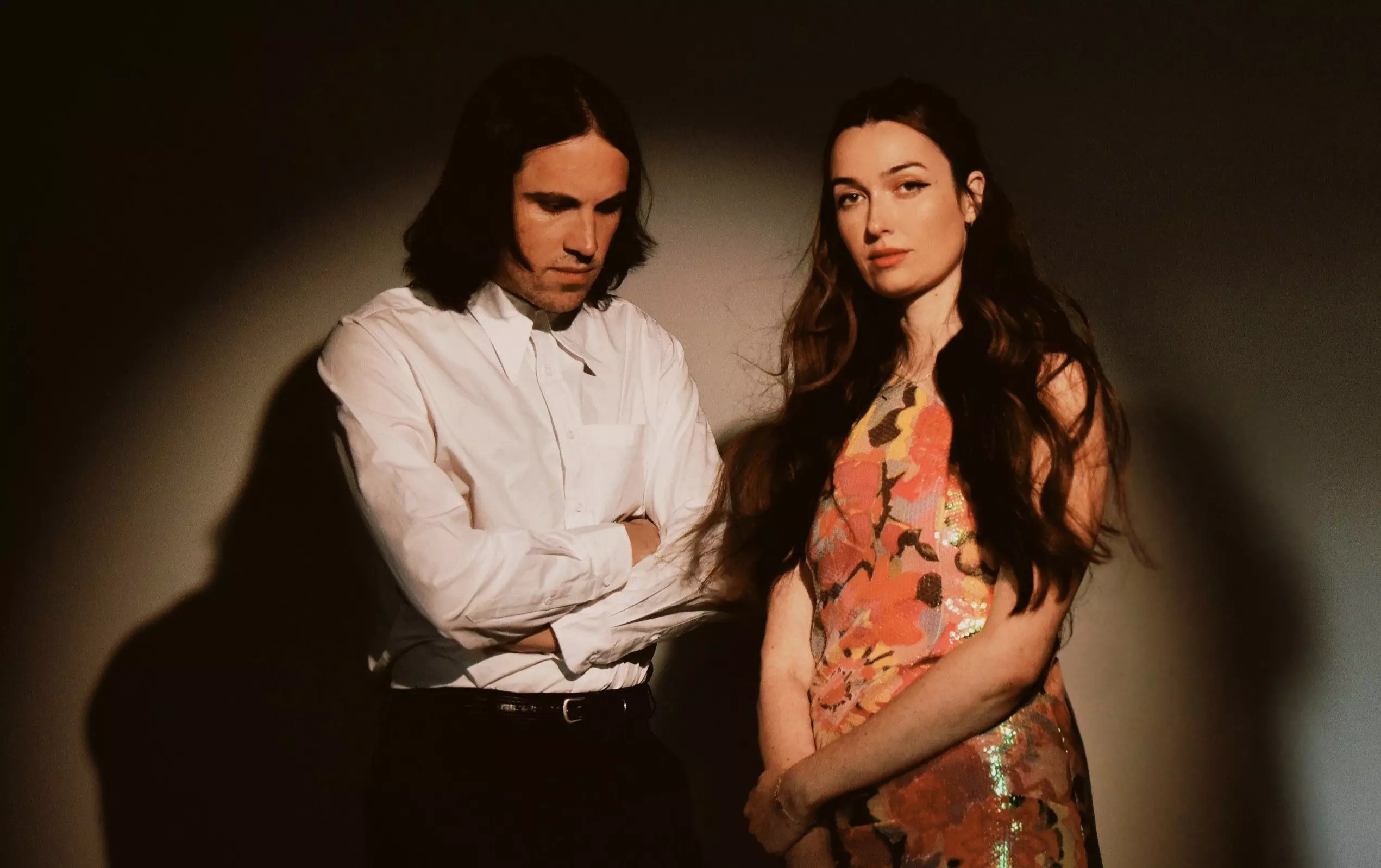
Cults' Evolution: Madeline Follin & Brian Oblivion Discuss Their Upcoming Album 'To The Ghosts'
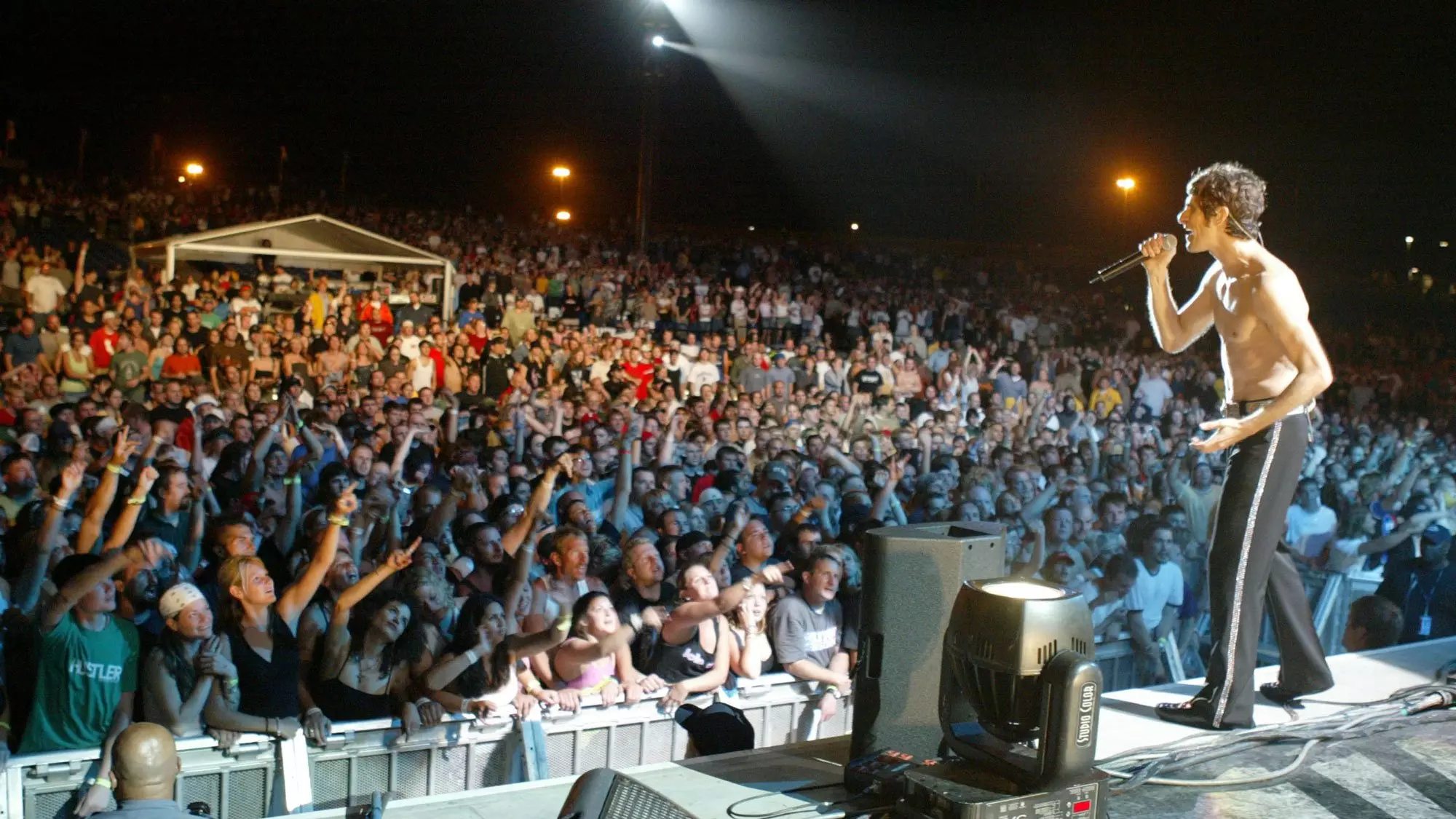
'Lolla: The Story of Lollapalooza' Recounts How An Alt Rock Fest Laid The Blueprint For Bonnaroo & More
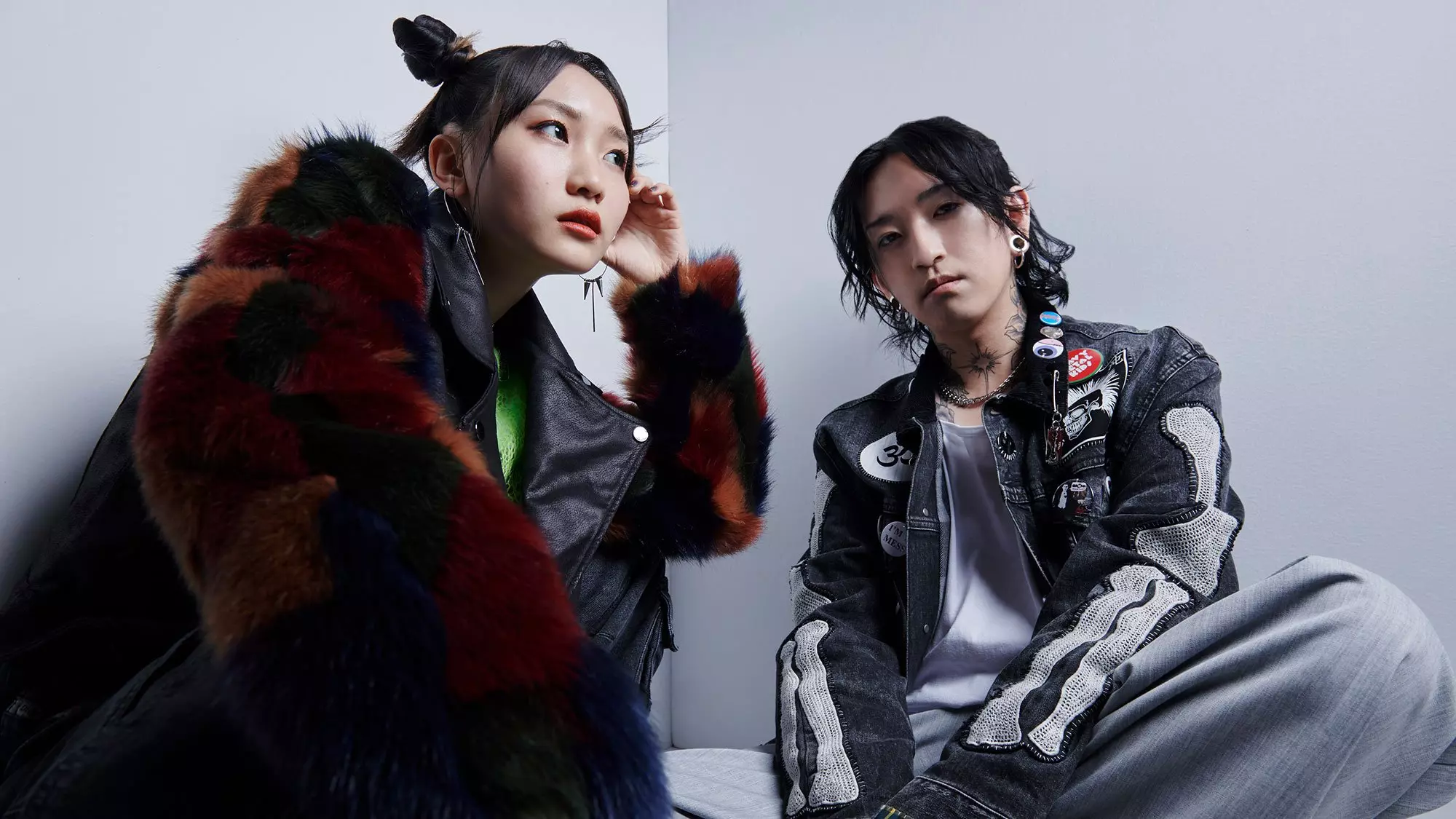
From Tokyo To Coachella: YOASOBI's Journey To Validate J-Pop And Vocaloid As Art Forms
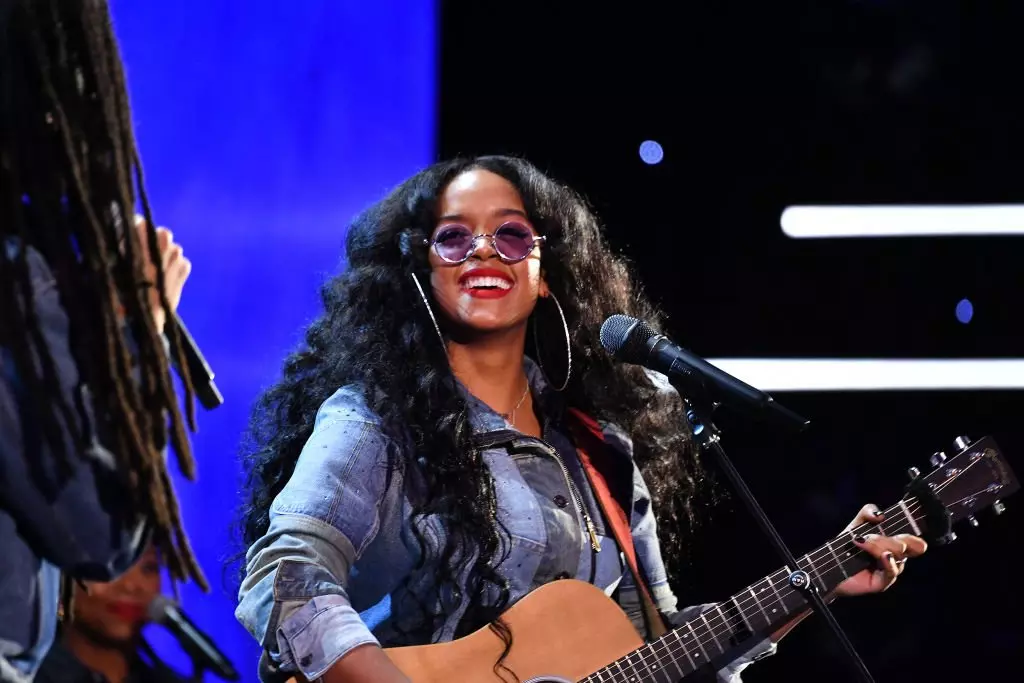
Lollapalooza Announces Lolla2020 Virtual Fest Celebration In Place Of Cancelled In-Person Event
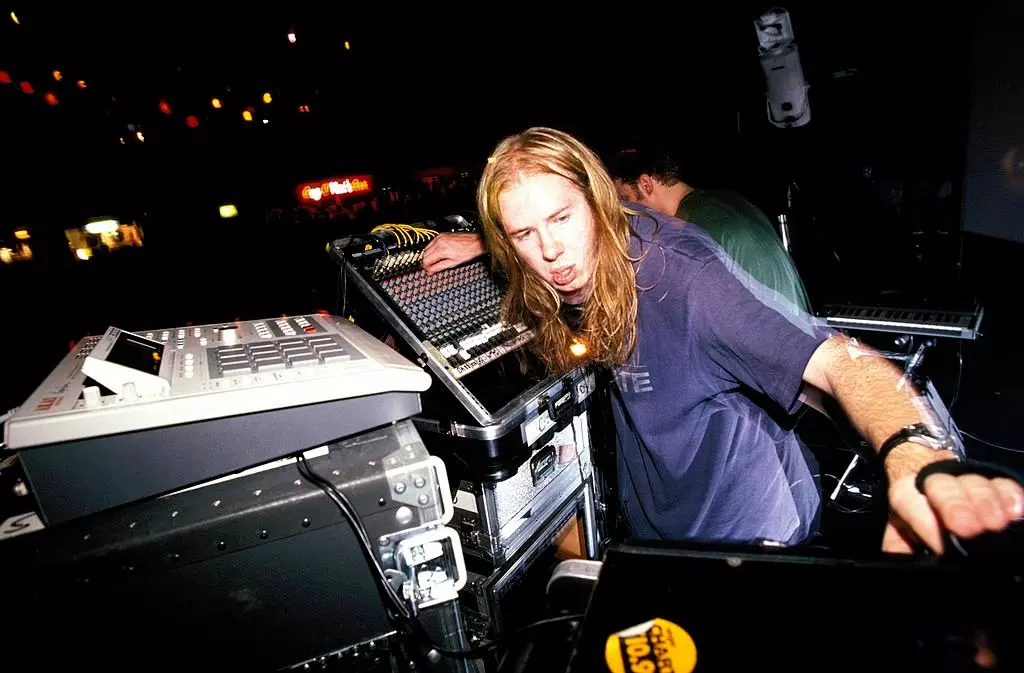
How 1995 Became The Year Dance Music Albums Came Of Age
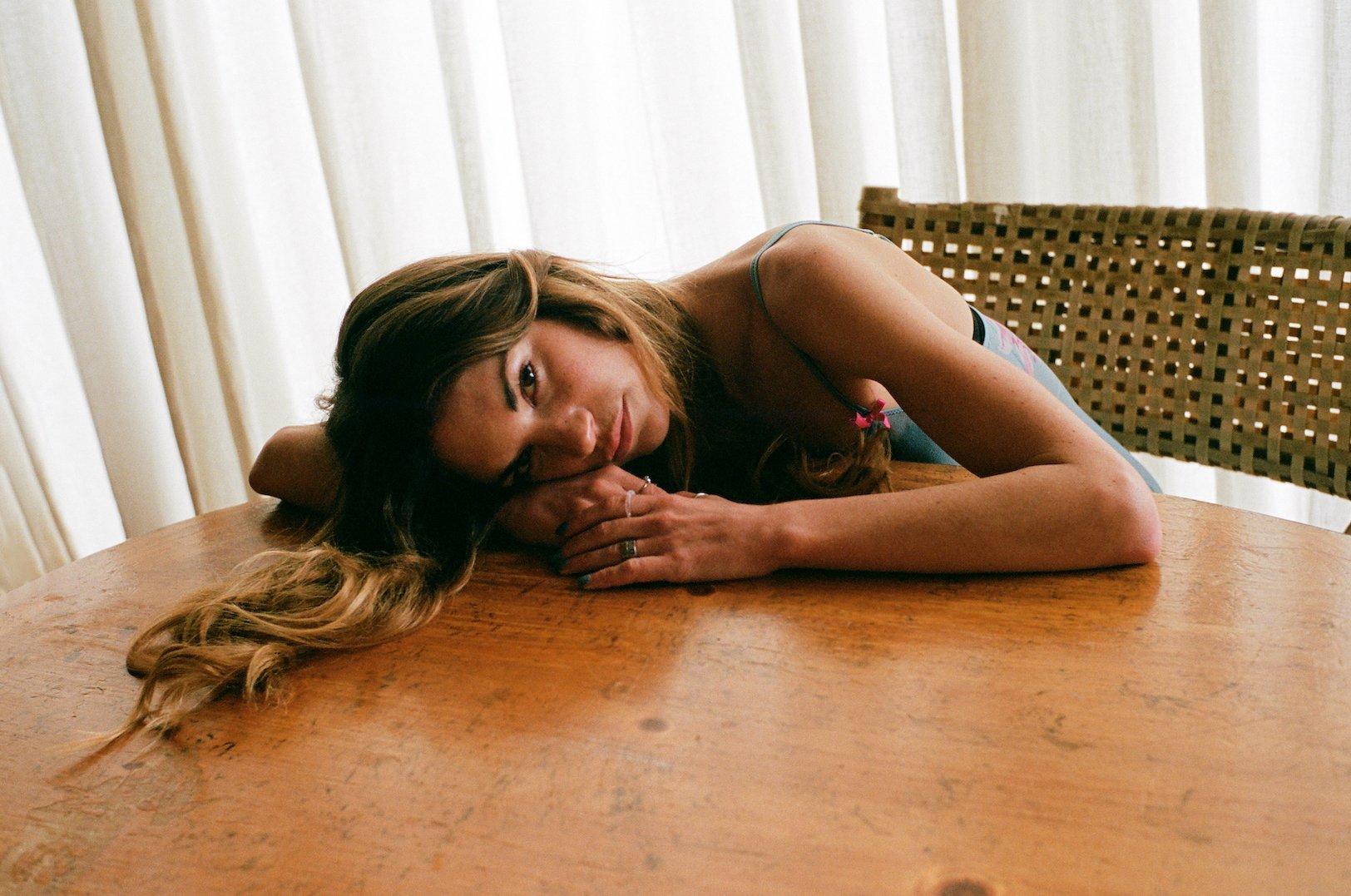
Photo: David O’Donohue
list
Meet Amy Allen, The Hitmaking Singer/Songwriter Behind Sabrina Carpenter's "Please Please Please" & More Pop Gems
Amy Allen has penned hits for stars like Halsey, Harry Styles, and Tate McRae, including two recent smashes from Sabrina Carpenter. As she embarks on her own artist journey, learn more about the GRAMMY-winner's already dazzling career.
Some artists are lucky enough to have a moment: a song of the summer, a radio hit, or a point at which their song dominates the pop conversation. Before even launching her own singing career, Amy Allen has done just that — multiple times.
In 2022, the Maine native contributed to hit songs from Harry Styles, Lizzo, Charli XCX, and King Princess; at the 2023 GRAMMYs, she was one of the inaugural nominees for Songwriter Of The Year, Non-Classical, and celebrated an Album Of The Year win alongside Styles thanks to her work on Harry's House. And as of press time, two songs she co-wrote with Sabrina Carpenter are in the top 10 of the Billboard Hot 100 chart: "Espresso" and "Please Please Please," the latter of which hit No. 1.
When you have a resume and catalog as impressive as Allen's, it's hard not to get stuck in a run of highlights — but Allen's writing style is so full of remarkable emotional depth and inevitable hooks that her life and career deserves further exploration. After binging on classic rock and performing in rock and bluegrass bands in her youth, Allen began writing songs for others in the mid 2010s and has only continued to expand her impact on audiences and collaborators alike.
"Amy is a once-in-a-lifetime writer and friend — it all comes to her very naturally and effortlessly," Carpenter recently told Variety. "She's super versatile: She can wear any hat and yet it still feels authentic. I've learned a lot from her and admire what an incredible collaborator she is."
Along the way, Allen has continued honing her skills as an artist in her own right, releasing a handful of EPs and singles since 2015, initially under the name Amy and the Engine. But on Sept. 6, she's ready to fully introduce herself with her debut album — fittingly titled Amy Allen.
Just after Allen celebrated her latest No. 1 and released her newest single, "even forever," GRAMMY.com rounded up the key details you need to know about the singer/songwriter's diverse musical background, from her advocacy for female creators to seeing Harry Styles sing a song she co-wrote to a massive audience.
Her Origin Story Features A Lot Of Car Talk
Allen's early musical growth relied on four-wheeled vehicles to drive the plot forward — in many different forms. Growing up in rural Maine meant long car rides to for school and family outings, which in turn meant a lot of time with the radio.
"My dad is the biggest classic rock fan, so since I was little, I spent hours every day listening to music in the car with him and my sisters," she told Variety earlier this year.
When it came time for one of her sisters to start a band, the elder Allen named it No U-Turn, setting the theme. When the band needed a new bassist, Amy took up the low end at just 8 years old, learning classic songs from the likes of Tom Petty and Rolling Stones. The band started collecting opening spots at a bar in Portland, Maine, and lasted until Allen was in high school and her sisters had left for college. In addition, she started playing in a bluegrass band called Jerks of Grass alongside her high school guitar teacher.
Eventually, Allen thought about moving on and changing course. "I went to nursing school at Boston College for two years, and within a month of getting there I was like, 'I made a big mistake,'" she continued. After moving over to the prestigious Berklee School of Music, Allen started a new project, yet again turning to vehicular terminology: Amy and the Engine, who would go on to open for the likes of Vance Joy and Kacey Musgraves. The project's timeless indie pop charm shone brightly on singles like "Last Forever" and the 2017 EP Get Me Outta Here!, fusing references ranging from the Cranberries to the Cure.
She's A Major Champion For Women In Music
Back in 2021, Allen pondered whether it was time to carve up one of America's most prominent monuments. "Can you imagine tits on Mount Rushmore/ And Ruth Bader Ginsburg from dynamite sticks?" she sang on "A Woman's World," a highlight from her 2021 solo EP AWW!. The song backs off from that explicit ask, but the low-slung waltz of ghostly piano and gentle acoustic guitar still subversively slices at traditional gender roles and power dynamics.
And while the track may focus its first verse on the Notorious RBG, Allen designed it as a more approachable anthem. "I felt very proud of that song. And it's something that I love to play live, because I think that it's nice as a woman to give that moment to other women in the audience where I see them," she told The Line of Best Fit upon the EP's release.
Her solo work sits in a long line of female pop and rock stars looking to lift others up — with Allen's list of influences including everyone from the Carpenters and Pat Benatar to No Doubt, Hole, and Siouxsie and the Banshees. But she's also aware of the shortcomings in the industry when it comes to behind-the-scenes matters, with female songwriters representing a disproportionately small percentage of the industry and often at lower revenue than their male counterparts.
"It's important to have more women writing and performing so that younger girls can be hearing that and really connecting with that and resonating with that, and then being inspired to do that themselves," she continued. "I'm really excited to hear what the next generation of singer songwriters creates, and I want to do my part in making sure that they're able to."
She Went Full Circle With Selena Gomez
Allen's emotionally salient and indelibly quirky songwriting with the Engine caught the attention of more than just adoring fans. While on a tour stop in New York, she connected with Scott Harris, a songwriter who has worked with the likes of Shawn Mendes, Camila Cabello, Niall Horan, and Meghan Trainor; when Allen eventually moved to New York, she would take on some of Harris' writing sessions when he was in Los Angeles. One of those sessions spawned the first song she'd place with another artist: Selena Gomez's "Back To You," which ended up on the soundtrack for the second season of Netflix's teen drama "13 Reasons Why" in 2018.
"I grew up listening to Selena Gomez, and I know that she's going to be a pop icon forever," Allen told People in 2020. "She's awesome. I was so psyched…It definitely propelled my career in the pop writing field further."
Two years later, she would re-team with Gomez for "My Mind & Me," a single released alongside a documentary film of the same title following the impact of the star's diagnoses with lupus and bipolar disorder on her career. The single similarly offers an openhearted, empathetic look at big mental health struggles, this time in the form of a sweeping, cathartic power ballad driven by stumbling syllables and stair-step piano.
The track was shortlisted for Best Original Song at the 2023 Academy Awards, charted in more than a dozen countries, and, perhaps most importantly, seemed to have made quite the connection with Gomez. "Honestly, it was therapeutic for me," the pop star and actress told Variety in 2022. "I felt super connected to what I was singing and what I was saying."
She Loves Seeing Her Collaborators Live
Songwriters often wind up hidden behind the scenes, unable to really gather the impact that their artistic expression is making on others. But thankfully, Allen has been able to catch a peek in on the arena-sized reactions for some of her biggest collaborators.
One of Allen's most-played co-writes is "Adore You," a highlight from Harry Styles' 2019 album, Fine Line, which has nearly 1.7 billion streams on Spotify alone as of press time. The buoyant, slippery burst of Fleetwood Mac-indebted funk pop embodies the start of an infatuation, and fans similarly felt under the song's spell. And Allen finally got to see that feeling come to life at Styles' album release show at the Kia Forum in Los Angeles in 2019.
"Watching Harry, I was really nervous because the album had only been out for a couple days and I wasn't sure if anybody would know that song," Allen told Variety in 2020. She also noted that the song was a hard turn from more heartbroken tracks she'd written for the likes of Halsey. "'Adore You' was my first feel-good song, so I'm psyched about that," she added.
Though not in person, Allen got a similar bolt of joy when she was able to watch Lizzo perform Styles' track for BBC Radio 1 in 2020. "I idolize Lizzo," Allen continued. "It really just goes to show that the right song can be performed by many different people."
Little did Allen know that she'd get to celebrate a GRAMMY nomination and win alongside Lizzo and Styles, respectively, just three years later. She co-wrote "If You Love Me" from the flute-jamming pop star's 2022 record Special, which was nominated for Album Of The Year at the 2023 GRAMMYs, where Styles' Harry's House (which featured Allen's co-write "Matilda") won the coveted honor.
She Shapeshifts Her Songwriting For Each Artist
When a songwriter has to split their tracks up between multiple different artists, it might be difficult to ensure that each track sounds appropriately fitted to each performer. For Allen, it all comes down to knowing when to follow the rules and when to break them.
"Sometimes we'll be writing and someone will say, 'It should go straight to the chorus here,' and in my brain I'm like, 'But we need a pre-chorus!' — you know, following the ABCs of songwriting," she told Variety. "But I've really been trying over the last couple of years to deconstruct some of those — that you don't need to pull out all the tricks all the time. It can actually make the song more interesting."
In fact, it might come down to what she prioritizes when sitting down to write, rather than which rules to follow. While walking the red carpet for the 2021 Ivor Novello Awards for songwriting and composition, Allen explained her perspective on songwriting formulas to PRS For Music: "When I'm writing for myself, I usually start with the verse and move my way through, and lots of other times when I'm writing with another artist I make sure the chorus is bulletproof."
The GRAMMYs Are Helping Change Her Family's Perspective On Her Career
Allen earned her first GRAMMY nomination in 2022 for her work on Justin Bieber's Justice, but her most meaningful nomination came a year later for Songwriter Of The Year, Non-Classical at the 65th Annual Awards ceremony (alongside Nija Charles, The-Dream, Laura Veltz, and Tobias Jesso, Jr.). While Allen had a hard time contextualizing the recognition, it helped her loved ones better understand the impact of her career.
"I'm just so grateful…Even my closest family and friends, they're like, 'I've listened to this artist for so long, or I listened to this song on the radio, and I had no idea there was a team that helped make this happen,'" she told VERSED: The ASCAP Podcast in 2022. "People like me growing up in small towns, we don't know that being a songwriter for a career is an option… I watched the GRAMMYs when I was growing up, and if I had known that people were making great careers, I would've gotten on the track a lot earlier."
Though the inaugural award ultimately went to Jesso, Jr., Allen seems to agree that he's deserving of the honor — he's one of her collaborators on her upcoming album.
Maine Will Always Be Home — and An Inspiration
For those who haven't been to Maine, a quick look at Allen's social media will reveal just how stunning the American Northeast can be. Among TikToks promoting her music, Allen almost inevitably drops in a clip displaying the expansive natural beauty of her home state — whether she's on a rope swing over a dazzlingly blue pool of water, or dropping a front spin while skating on the ice, or watching the massive waves from her family home.
"POV: ur back home in maine and wondering why u ever left," she plastered over one particularly stunning TikTok montage of a dazzling day swimming amongst waterfalls. The only thing as beautiful as the scenery is the music behind it is an unreleased track about missing home — proof that Maine will always be part of her, and that she clearly made the correct choice in following her songwriting dreams.
Latest News & Exclusive Videos

2024 Paris Olympics Opening Ceremony: Watch Celine Dion, Lady Gaga, Gojira & More Perform

Ice Spice Is The Drill Queen On 'Y2K!': 5 Takeaways From Her Debut Album

New Music Friday: Listen To New Songs From Halsey, MGK And Jelly Roll, XG & More

Watch Young MC Win Best Rap Performance In 1990

The Red Clay Strays Offer A New Kind Of Religion With 'Made By These Moments'
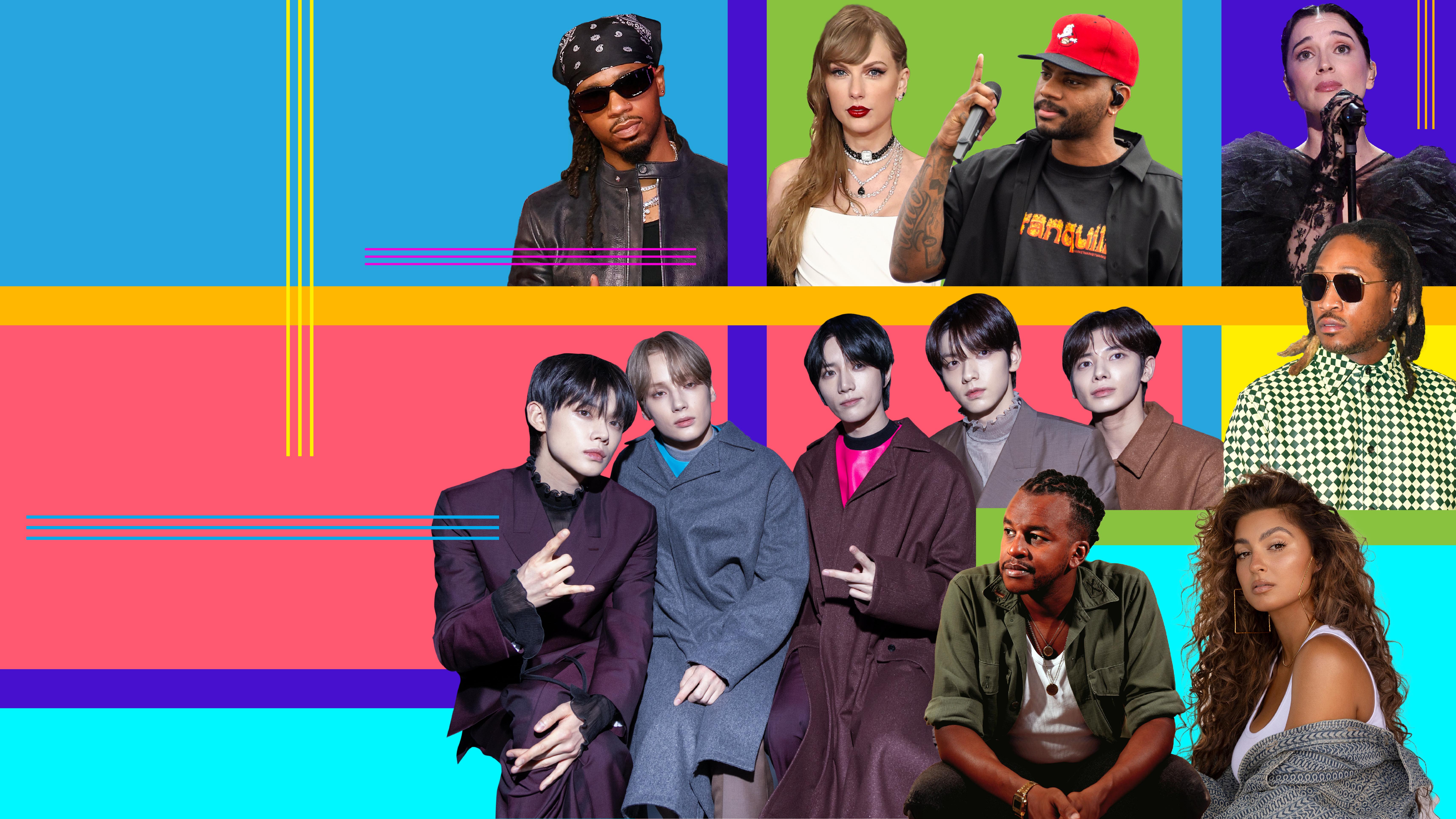
Photos: Taylor Hill/Getty Images; Kevin Mazur/Getty Images for The Recording Academy; Joseph Okpako/WireImage; Chloe Morales-Pazant; Mike Coppola/WireImage; Sasha-Samsonova; Prince Williams/WireImage; Peter White/Getty Images
list
15 Must-Hear Albums In April 2024: Taylor Swift, Vampire Weekend, St. Vincent & More
April promises to shower listeners with heavy-hitting hip-hop, pop, country and rock releases. From Metro Boomin and Future's upcoming collab, to TOMORROW x TOGETHER's new minisode, get your April 2024 playlist ready with 15 exciting new releases.
This year, April brings more than just showers to beget May flowers. Instead, there must be something in the stars: In the fourth month of 2024, four artists are releasing their fourth studio albums. These are pop-rock band X Ambassadors’ Townie, R&B singer Bryson Tiller’s Bryson Tiller, rapper PartyNextDoor’s P4, and Irish rockers Picture This’ Parked Car Conversations.
Numerology aside, April will also contemplate exciting new works from pop masters Taylor Swift, whose The Tortured Poets Department drops mid-month, and St. Vincent’s All Born Screaming, country star ERNEST’s Nashville, Tennessee, jazz master Kenny Garrett and electronic producer Svoy’s What Killed AI?, and — allegedly — the second part of Future and Metro Boomin’s first joint-effort, We Don’t Trust You.
There’s music for all tastes ready to fill your playlists for the rest of the year. Read on for 15 of the most exciting albums dropping in April 2024.
TOMORROW X TOGETHER - minisode 3: TOMORROW
Release date: April 1
Luckily, fans of the K-pop quintet TOMORROW X TOGETHER (TXT) rarely have to wait for new music. Six months after releasing their third studio album, The Name Chapter: Freefall, the group is gearing up to release minisode 3: TOMORROW.
The seven-song EP is fronted by upcoming lead single "Deja Vu," which is said to mix trap, rage, and emo rock into their signature emotional intensity, as per a press release. The other tracks continue to expand the group’s versatility, experimenting with pop rock, house, and acoustic guitars.
As usual, the concept of the album is connected to TXT’s overarching lore, and features several references to their past works — track "- --- -- --- ·-· ·-· --- ·–," for example, evokes their debut era where Morse Code was used in teasers and in the single "Crown."
TXT will embark on their Act: Promise World Tour starting May 3-5 in Seoul, South Korea, and then head to the U.S. for 11 shows across the country, including two dates at New York’s Madison Square Garden.
Conan Gray - Found Heaven
Release date: April 5
Gen Z popstar Conan Gray has Found Heaven. After 2022’s Superache, his upcoming third album was co-produced by legendaries Max Martin, Greg Kurstin, and Shawn Everett, among others.
Gray had been teasing the 13-track record since last year with a slew of buoyant, '80s-tinged singles ("Never Ending Song," "Killing Me" and "Lonely Dancers") and poignant, Elton John-esque ballads ("Winner," "Alley Rose"). "When I was making the album, I was really obsessively listening to music of that era," he explained to NME. "I think also, because it was a deeply emotional time, I was almost hiding from reality. I didn’t listen to a song from the 2020s during the making of this album."
To celebrate this new, holy era, Gray will be touring Australia in July, North America in September and October, and Europe and the UK in November. "I want people to know that I was having fun and goofing around, and I want you to smile and I want you to feel like you can just be yourself," he added. "I just want the album to be a reminder to people that you can be so many things all at once."
Sinkane - We Belong
Release date: April 5
Ahmed Gallab, the Sudanese American multi-instrumentalist behind Sinkane, has built his discography resisting musical genres. We Belong, his upcoming eighth studio album, is no different: it combines pop, funk, electronic, afrobeats, disco, and more into "a love letter to Black music," per a press release.
Sinkane’s first album since 2019’s Dépaysé, We Belong features 10 tracks and participations by Bilal, Money Mark, STOUT, and others. Each song tells the story of a different era in Black music and history, laced with love and hope for the future: the disco groove of "Come Together," the gospel choirs of "Everything Is Everything," the funky bassline of "How Sweet is Your Love."
Along with live band the Message, Sinkane has announced a select 10-city tour in the U.S., starting May 3 in New York City and wrapping up on June 9 in Pioneertown, California.
X Ambassadors - Townie
Release date: April 5
**Pop rock trio X Ambassadors dive deep into nostalgia for Townie, their fourth studio album. The record was inspired by their experience of growing up in the small city of Ithaca, New York, and how it shaped who they are.**
"As a grown man, I’ve fallen back in love with upstate NY, and I oddly feel blessed to have had something to rally so hard against/fight to escape from as a kid," vocalist Sam Harris said in a statement. "No Strings," the first single off the project, is an anthem for that restless feeling, and anchors their concept in a haunting, propulsive melody. "Your Town" and "Half-Life" continue the journey, although taking more melancholy tones.
X Ambassadors first set off their Townie tour in Europe and the UK during February and March. On the day of the release, they will begin the North American leg of the tour in Vancouver, Canada.
Vampire Weekend - Only God Was Above Us
Release date: April 5
Five years after releasing their latest record, 2019’s Father of the Bride, indie band Vampire Weekend will drop their fifth studio album, Only God Was Above Us.
According to a press release, frontman Ezra Koenig wrote most of the songs in 2019-2020, and spent the last five years refining them with bandmates Chris Baio and Chris Tomson. The result is a collection of 10 "direct yet complex" tracks, "showing the band at once at its grittiest, and also at its most beautiful and melodic," as seen in singles "CAprilicorn," "Gen-X Cops," and "Classical."
In addition to a sold out performance in Austin, Texas that will coincide with the total eclipse on April 8 and a headline show at Primavera Sound festival in Barcelona, Vampire Weekend has announced an extensive North American tour throughout summer and fall.
Bryson Tiller - Bryson Tiller
Release date: April 5
Grab your tickets to Bryson Tiller’s upcoming tour while you can: he might go on a hiatus right after. That’s what the R&B singer and rapper told Complex, alleging that his number one passion is actually video games. "I've been designing a game for the past three years; been looking into internships for different companies. That's what I want to prioritize after this album comes out."
The album Tiller refers to is his eponymous fourth LP, a 19-track collection that includes a feature by Victoria Monét, and is described as "seamlessly blending R&B, dancehall, pop, drill, trapsoul, neo-soul, and hip hop" in a press release. "Bryson Tiller is not just an album; it's a declaration of artistic independence and a tribute to the relentless pursuit of greatness."
The project’s three alluring singles ("Outside," "Whatever She Wants," and "CALYPSO") exemplify how Tiller pushed the boundaries of R&B even more, and solidified his identity as one of music’s most singular artists. "My No. 1 goal with this album is just for everybody on Earth to hear it one time," Tiller also told Complex. "My guarantee is that they'll love [at least] one song."
Tori Kelly - TORI.
Release date: April 5
"You think you know who Tori Kelly is, but this album will prove that maybe you didn’t," said the YouTube-star-turned-singer in a NME interview about her fifth studio album, TORI. "I feel like I’m stepping into my power and owning my craft."
Her first LP since 2020’s A Tori Kelly Christmas, TORI. took inspiration from '90s and early aughts R&B and pop, as heard on singles "Missin U" and "Cut." "I was trying to create this world of nostalgia, but also there’s that balance with [TORI.] feeling fresh and new," she said. Comprising 15 tracks, it also includes participations by Ayra Starr in "Unbelievable," LE SSERAFIM’s Kim Chae-won on "Spruce," and Jon Bellion — who co-wrote and produced the album — on "Young Gun."
During the creation process, Kelly told Bellion that her guidelines were to be able to "belt out [songs] in the car" and "dance" to them, like one can do in the powerful "High Water." As far as it goes, it looks like they accomplished their mission.
Kelly will kick off her Purple Skies North American tour on April 12 in Ventura, California, and conclude it on May 3 in Kansas City, Missouri.
Future & Metro Boomin - TBA / We Still Don’t Trust You
Release date: April 12
Rap titans Future and Metro Boomin have been personal friends and work peers for over a decade, but their first collaborative album is only coming out now. We Don’t Trust You, the first installment of a double album, dropped on March 22, while the second part — titled yet to be announced — is slated to release on April 12.
In We Don’t Trust You, the duo showcased their flawless chemistry with grandiose tracks, haunting trap beats, and star-studded features, such as "Like That" with Kendrick Lamar, "Young Metro" with The Weeknd, and "Type S—" with Travis Scott and Playboi Carti. As Metro defined in an interview with Complex, "it’s the classic Future and Metro, but just updated."
So far, no further details have been shared about the second album, but expectations remain high for the duo to outdo the first effort.
girl in red - I'M DOING IT AGAIN BABY!
Release date: April 12
"I wanted to sincerely apologize for the events that happened directly after the release of my second album, I'M DOING IT AGAIN BABY!" prefaced Norwegian singer girl in red — real name Marie Ulven — on a solemn social media video last month. But while viewers caught their breaths, she revealed it was all a witty joke: the album will only come out on Aprilil 12.
"This is a big year for me. 2024 is, like, my year," she added in the video. I'M DOING IT AGAIN BABY! follows Ulven’s 2021 debut If I Could Make It Go Quiet, but feels "more fun and more playful, and a little bit more confident," as she told Billboard. Lead track "Too Much" brings that novelty heads on, while singles "Doing It Again Baby" and "You Need Me Now?" with Sabrina Carpenter prove that Ulven’s powerful pop is only getting better.
Ulven will kick off her Doing It Again tour from April 16-June 2 in North America, and from Aug.27-Oct. 5 in Europe.
Kenny Garrett & Svoy - Who Killed AI?
Release date: April 12
For his first electronic foray, NEA Jazz Master and GRAMMY-winning saxophonist Kenny Garrett enlisted the acclaimed producer-musician Svoy. The result is Who Killed AI?, a seven-track daring exploration of jazz and pop culture.
"The first two songs are really reminiscent of Miles [Davis]," Garrett shared in a statement. "The way I’m stretching the melody — that’s how I played with Miles." The opener and lead single "Ascendence" is a strong preview of what’s to come: distorted synths and drum and bass beats fused with Garrett’s fun and brilliant lines, a compelling portrait of what the future of music can be.
Later in the year, Garrett plans to take the album on a live tour. "I think my fans will find this interesting," Garrett shared in a statement. "Some people forget that my teacher was Miles Davis. So for me, it’s not that I have to do something different. It is just something that I do. All you have to do is present the music and let them take the journey."
ERNEST - Nashville, Tennessee
Release date: April 12
Early in March, singer/songwriter ERNEST announced on social media that he would be running for mayor in order to "legalize country music." Of course, fans started to get their hopes up for new music — and they were right. The plot was just part of his promotion for the newly announced Nashville, Tennessee, out April 12.
A tour de force with 26 tracks, the record features a bevy of guest stars: from Jelly Roll ("I Went To College, I Went To Jail"), to Lainey Wilson ("Would If I Could"), and ERNEST's two-year-old son, Ryman Saint. It also includes a bluegrass cover of Radiohead’s "Creep" with HARDY, and a cover of John Mayer’s "Slow Dancing in a Burning Room."
In addition to "I Went To College, I Went To Jail," four other advance tracks have been shared: "Why Dallas" with Lukas Nelson, "Ain’t As Easy," "Ain’t Too Late," and "How’d We Get Here."
Taylor Swift - The Tortured Poets Department
Release date: April 19
On the same night that she won her lucky 13th GRAMMY for Best Pop Vocal Album with 2022’s Midnights, Taylor Swift also announced her 11th studio album, The Tortured Poets Department. Coming out April 19, the record will feature 16 tracks and collaborations by Florence + the Machine on "Florida!!!" and Post Malone on "Fortnight."
"I needed to make it, it was really a lifeline for me, it sort of reminded me why songwriting gets me through life," Swift said during her The Eras Tour show in Melbourne. "I've never had an album where I needed songwriting more than I needed it on Tortured Poets."
Along with the statement, Swift also shared an alternate cover for the physical album, titled after and including bonus track "The Bolter." Later on, three other versions named "The Manuscript," "The Albatross," and "The Black Dog" — all including an eponymous bonus track — were also made available for purchase.
For the rest of the year, Swift will be touring through Europe and North America. As usual with the singer, more surprises are likely to come soon.
PartyNextDoor - PartyNextDoor 4 (P4)
Release date: April 26
**Canadian hitmaker and singer PartyNextDoor will make his long-awaited return this month. PartyNextDoor 4, also dubbed P4, is his first full-length work since 2020’s Partymobile, and continues his eponymous albums series after 2016’s P3.**
"This is the hardest I’ve ever worked on an album. This is the proudest I’ve felt," Party told Billboard for his March cover story. "I’m excited to grind even more for the next [one]. I’m in love with how hard you should work for it."
He also explained that love is the reason why he takes so long to release new stuff. "I get into relationships and then music becomes second," he said. "I think I’m going to take a break from relationships, a long break, and just get back to making music."
In support of the release, Party shared moody, intimate singles "Resentment" and "Real Woman" — inspired by the same relationships that kept him off stage.
St. Vincent - All Born Screaming
Release date: April 26
In an interview with Mojo, St. Vincent — also known as Annie Clark — defined her upcoming seventh album, All Born Screaming, as "post-plague pop." Since its creation started right after the release of 2021’s Daddy’s Home, the years of seclusion and adjustment due to the COVID pandemic were a prominent influence in her new work.
"That kind of isolation breeds paranoia and loneliness, and loneliness can breed violence," she said. "It’s been a time of loss collectively and personally. [But] loss and death are very clarifying things, they make everything that doesn’t f—ng matter go away."
Comprising 10 tracks and features from Dave Grohl, Cate Le Bon, and Warpaint’s Stella Mozgawa, All Born Screaming is St. Vincent’s first entirely self-produced set, and an attempt at showcasing what does matter. "This record is darker and harder and more close to the bone. I’d say it’s my least funny record yet. There’s nothing cute about it," she added.
Clark released two singles off the album, "Broken Man" and "Flea," and is gearing up for a North American tour starting May 22.
Picture This - Parked Car Conversations
Release date: April 26
"Parked Car Conversations is by far the most personal album we have ever created," said vocalist and lyricist Ryan Hennessy in a press release about Picture This’s upcoming album. "It is an album about everything involved with being human. Love and loss and hurt and euphoria and all of those other complex emotions that flutter in between."
The album consists of 15 songs, but a third of it can be previewed through bittersweet, soaring singles "Get On My Love," "Song To Myself," "Leftover Love," "Call It Love," and "Act Of Innocence." Overall, Parked Car Conversations is a soundtrack "not to a movie, but to life," and aims to convey "the ups and downs of living" through ballads and anthems alike, according to Hennessy.
Coming almost three years since the Irish band’s last release, 2021’s Life in Colour, the new record will be celebrated in high spirits with an Europe and U.K. tour, starting April 21 in München, Germany.
10 Women In African Hip-Hop You Should Know: SGaWD, Nadai Nakai, Sho Madjozi & More
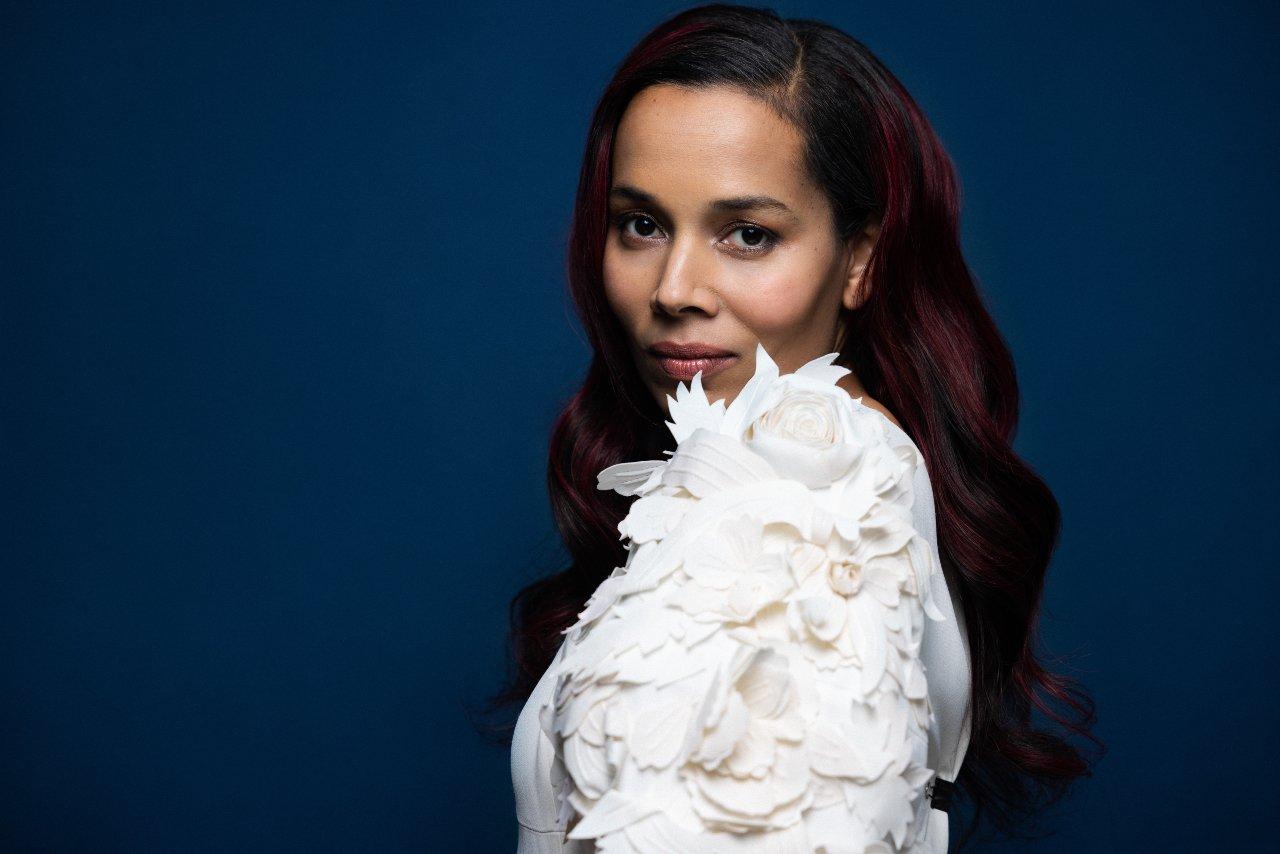
Photo: Ebru Yildiz
list
Who Is Rhiannon Giddens? 3 Things To Know About The Banjoist & Violist On Beyoncé’s "Texas Hold ‘Em"
Rhiannon Giddens has been esteemed in various folk circles for years — and her appearance on Beyoncé’s "TEXAS HOLD ‘EM" just broke her into the mainstream. Here are three things to know about the eclectic singer, songwriter and multi-instrumentalist.
After the club-storming Renaissance, its Act II begins with an unexpected sound: a burble of banjo, later joined by flowing viola. Welcome to "TEXAS HOLD ‘EM," one of two advance singles from Beyoncé’s forthcoming album, along with "16 CARRIAGES."
Beyoncé’s recently announced Act II promises to be an immersion into country music — which is both a fresh aesthetic and one deeply rooted to her Texan upbringing. The 32-time GRAMMY Winner has spoken about the "overlooked history of the American Black cowboy" and nodded to the culture with a Western getup at the 2024 GRAMMYs.
All of this is a completely natural fit for Rhiannon Giddens, who played said fiddle and viola on "TEXAS HOLD ‘EM."
"The beginning is a solo riff on my minstrel banjo — and my only hope is that it might lead a few more intrepid folks into the exciting history of the banjo," Giddens explained on Instagram. "I used to say many times as soon as Beyoncé puts the banjo on a track my job is done.
"Well, I didn’t expect the banjo to be mine," she continued. "And I know darn well my job isn’t done, but today is a pretty good day."
The "job" defines Giddens. Sure, she may be completely new to certain contingents of the Beyhive, but the two-time GRAMMY winner and 10-time nominee’s been on the scene for almost two decades.
Since making her mark with the Carolina Chocolate Drops in the mid-aughts, Giddens has forged a singular legacy. She’s not only a purveyor of traditional musics, but as an investigator of the racial and cultural cross-currents that forged our modern-day understanding — and misunderstanding — of Americana.
At the 2024 GRAMMYs, Giddons was nominated for two golden gramophones — for Best Americana Album (You’re the One) and Best American Roots Performance ("You Louisiana Man"). You’re the One was her first album of all-original material; in that regard, these noms show that a new, exciting chapter for Giddens is just beginning.
Here are five things to know about the artist who just played "TEXAS HOLD ‘EM" with Queen Bee.
Her Interrogation Of Black Music History Is Indispensable
Giddens has worked in a diverse array of fields, including opera, documentary, ballet, podcasting, and more. Her mission? To explore "difficult and unknown chapters of American history" through musical lenses, like the evolution of the banjo from Africa to Appalachia.
"In order to understand the history of the banjo, and the history of bluegrass music, we need to move beyond the narrative we've inherited," she’s stated. Elsewhere, she noted, "People seem ready for a more in-depth idea of folk music, culture and history.
Which extends beyond merely other people’s stories — but to her own.
…And It Led Directly To You’re The One
Speaking to GRAMMY.com about her GRAMMY-nominated first album of original material, Giddens was quick to note that "autobiography" doesn’t hit the mark.
"It doesn't express how I feel… they're still songs, and it's still a performance," Giddens said. "I'd say I'm drawing a little bit more from my experience, but I had to draw from my experience to write other people's stories.
"There's emotions that I feel that I then translate into these other stories," she added, "so I don't think this record is completely different from that."
She’s Made Killer Appearances With Paul Simon
Paul Simon’s ended his touring years, but he does make sporadic appearances, including at 2022’s "Homeward Bound: A GRAMMY Salute to the Songs of Paul Simon."
There, they performed a version of his epochal "American Tune," where he changed the words in nuanced ways as relates to the American origin story — and he enlisted Giddens to sing it with him.
"He didn't have to do nothing but sit back and collect his checks," Giddens told GRAMMY.com. "He made a statement with that song, and I don't want to take that away from him. I didn't change those words; he changed those words."
Where will Giddens go from her star turn with Bey? Wherever it might be, we’ll feel — and learn — something profound, one banjo strum at a time.
On You’re The One, Rhiannon Giddens’ Craft Finds A Natural Outgrowth: Songwriting
